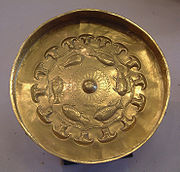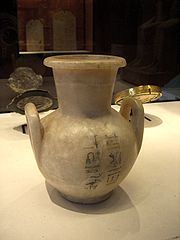
General Djehuty: 18th dynasty
Encyclopedia


Ancient Egypt
Ancient Egypt was an ancient civilization of Northeastern Africa, concentrated along the lower reaches of the Nile River in what is now the modern country of Egypt. Egyptian civilization coalesced around 3150 BC with the political unification of Upper and Lower Egypt under the first pharaoh...
king Thutmosis III in the 18th Dynasty
Eighteenth dynasty of Egypt
The eighteenth dynasty of ancient Egypt is perhaps the best known of all the dynasties of ancient Egypt...
. Djehuty bears the titles king's scribe, overseer of troops (general) and overseer of the northern foreign countries in contemporary Egyptian records.
Djehuty is known from two sources. His undisturbed burial was found in 1824 at Saqqara
Saqqara
Saqqara is a vast, ancient burial ground in Egypt, serving as the necropolis for the Ancient Egyptian capital, Memphis. Saqqara features numerous pyramids, including the world famous Step pyramid of Djoser, sometimes referred to as the Step Tomb due to its rectangular base, as well as a number of...
and he is the main personality in the Egyptian story of The Taking of Joppa
The Taking of Joppa
The Taking of Joppa is an ancient Egyptian tale describing the conquest of the town of Joppa by Thutmose III's general Djehuti. The extant copy of the text is on the verso of Papyrus Harris 500....
(today Jaffa
Jaffa
Jaffa is an ancient port city believed to be one of the oldest in the world. Jaffa was incorporated with Tel Aviv creating the city of Tel Aviv-Yafo, Israel. Jaffa is famous for its association with the biblical story of the prophet Jonah.-Etymology:...
).
The Egyptian narrative is preserved on a papyrus now located in the British Museum (EA 10060). The city of Joppa had rebelled against Thutmose III's authority and the pharaoh responded by dispatching an Egyptian army under Djehuty's control to regain control over the city. Djehuty first cunningly arranged to have a parley or talk with the rebel leader of Joppa at a location outside of the city walls. Once he was alone with the leader of the rebellion, Djehuty promptly smote the man on his forehead and captured him. With this task accomplished, Djehuty decided to take control of the city by subterfuge. Djehuty first falsely proclaimed that he, Djehuty, had been defeated by the rebels and was now sending "tribute" to the inhabitants of Joppa. The tribute came in the form of 200 baskets which were delivered to Joppa as a peace offering by Djehuty. Unbeknownst to Joppa's inhabitants, however, the baskets concealed two hundred of Djehuty's own soldiers.
The governor of Joppa, fooled by Djehuty's ruse, had them taken into the city through its city gates. Soon after, Djehuty's soldiers rose out of their baskets and quickly captured the city and seized its citizens. The Egyptian description of the capture of Joppa is, hence, somewhat similar to the story of the Trojan Horse which occurred some two centuries later at Troy
Troy
Troy was a city, both factual and legendary, located in northwest Anatolia in what is now Turkey, southeast of the Dardanelles and beside Mount Ida...
. With Joppa now firmly back in Egyptian hands, Djehuty sent word to his king, Thutmose III, of his triumph:
General Djehuty's historicity
.jpg)
Bernardino Drovetti
Bernardino Michele Maria Drovetti was an Italian diplomat, lawyer, explorer and antiquarian, appointed by Napoleon as French consul to Egypt at a time when the country and its antiquities were being opened rapidly to European knowledge and acquisition. His methods were deplorable...
found his completely undisturbed tomb at Saqqara. In these early days, Egyptian archaeology was in its infancy and only a few notes of the excavations were ever made. Today, there are only brief descriptions of the discovery preserved in archaeological records. The objects were sold to different museum collections all around the world and, in most cases, can only be ascribed with certainty to Djehuty's tomb when they bear his name. The objects found in the general's tomb include a solid golden and a silver bowl, both today in the Louvre, four canopic jar
Canopic jar
Canopic jars were used by the Ancient Egyptians during the mummification process to store and preserve the viscera of their owner for the afterlife. They were commonly either carved from limestone or were made of pottery...
s now in Florence
Florence
Florence is the capital city of the Italian region of Tuscany and of the province of Florence. It is the most populous city in Tuscany, with approximately 370,000 inhabitants, expanding to over 1.5 million in the metropolitan area....
, the heart scarab, a gold bracelet in the Rijksmuseum
Rijksmuseum van Oudheden
The Rijksmuseum van Oudheden is the national archaeological museum of the Netherlands. It is located in Leiden. The Museum grew out of the collection of Leiden University and still closely co-operates with its Faculty of Archaeology...
of Leiden and Djehuty's dagger in Darmstadt
Darmstadt
Darmstadt is a city in the Bundesland of Hesse in Germany, located in the southern part of the Rhine Main Area.The sandy soils in the Darmstadt area, ill-suited for agriculture in times before industrial fertilisation, prevented any larger settlement from developing, until the city became the seat...
. Nothing is known about Djehuty's coffin and mummy, although they were briefly mentioned by Drovetti.
It is also believed that the Ashburnham ring, which is "one of the most spectacular pieces of Egyptian jewellry to be added to the [British Museum's] national collection for many years" also originated from General Djehuty's burial. The ring was originally purchased by the Earl of Ashburnham in Cairo in 1825 likely from the proceeds of excavation work carried out by Drovetti in Saqqara and Djehuty's tomb was only discovered in the previous year. This rectangular swivel, bezel ring weighs 35.8 grams and is inscribed on both its sides with the texts: "He of the Two Ladies, Great of terror in all lands" and "Menkheperre, beloved of Ptah, radiant of face." Since Christine Lilyquist's study of Djehuty's gold bowl and other funerary objects showed that Djehuty was likely buried at Saqqara and not Thebes as originally assumed, it would appear that the Ashburnham ring came from Djehuty's tomb treasures.
Djehuty's golden bowl in the Louvre contains an inscription which records that it was a gift by Thutmose III to his general:
- "Granted by royal favor of Menkheperre (Tuthmosis III), King of Upper and Lower Egypt, to his excellency the noble, father of the god, beloved of the god, man of confidence of the king in all foreign lands and on the islands amid the sea, he who fills the stores with lapis lazuli, silver and gold, the general...[and] the royal scribe Djehuty, acquitted."
Literature
- C. Lilyquist: The Gold Bowl Naming General Djehuty: A Study of Objects and Early Egyptology, In: Metropolitan Museum Journal, Vol. 23, 1988 (1988), pp.5-68
- N. Reeves: The Ashburnham ring and the burial of General Djehuty: In: Journal of Egyptian Archaeology 79 (1993), pp.259-261

